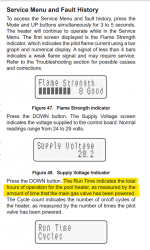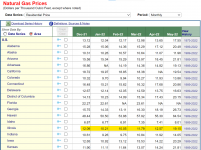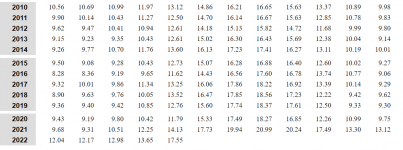Kind of an unusual question and I'm not sure there is a good answer, but thought I'd ask anyway. We had a significant increase in the cost of gas and suspect that heating our pool might be the issue. The 60k pool was being maintained at 87-88 degrees. We have since turned it down to 82 degrees, but residents are complaining. Would anyone have a rough estimate of what it costs to raise the temp by one degree (or 5 degrees) in a 60k pool? Is there any way to calculate this to get a rough idea? Also.... is it better to maintain the temp at one setting all the time or is there any savings to be had by turning down the temp during the evening hours when the pool is unoccupied (10:00 pm to 8:00 am)?
Pool Heating Costs?
- Thread starter JPMorgan
- Start date
You are using an out of date browser. It may not display this or other websites correctly.
You should upgrade or use an alternative browser.
You should upgrade or use an alternative browser.
- May 23, 2015
- 24,487
- Pool Size
- 16000
- Surface
- Plaster
- Chlorine
- Salt Water Generator
- SWG Type
- Pentair Intellichlor IC-60
What are the BTUs per hour of the heater. It takes 1 BTU of energy to raise 1 pound of water 1 degree F. If you know the heater output in BTUs per hour, it’s fairly easy to calculate the temperature rise per hour. You also need to know how much your energy source costs. If it’s natural gas, then you need to know dollars per therm. If it’s propane, then it’s dollars per gallon. From there we can do a quick calculation.
"In April, the average natural gas rate in Elmhurst was $1.23 per therm." Quote from lienenergy. com.Kind of an unusual question and I'm not sure there is a good answer, but thought I'd ask anyway. We had a significant increase in the cost of gas and suspect that heating our pool might be the issue. The 60k pool was being maintained at 87-88 degrees. We have since turned it down to 82 degrees, but residents are complaining. Would anyone have a rough estimate of what it costs to raise the temp by one degree (or 5 degrees) in a 60k pool? Is there any way to calculate this to get a rough idea? Also.... is it better to maintain the temp at one setting all the time or is there any savings to be had by turning down the temp during the evening hours when the pool is unoccupied (10:00 pm to 8:00 am)?
Your 266 uses 2.65 therms per hour (the rating plate will tell you it is a 265K btu heater). 1 therm = 100,000btu more or less (99976.1)
- May 23, 2015
- 24,487
- Pool Size
- 16000
- Surface
- Plaster
- Chlorine
- Salt Water Generator
- SWG Type
- Pentair Intellichlor IC-60
If the patrons of the pool want it warm, then they need to be prepared to deal with a bubble cover. In order to not waste huge amounts of money on gas, it is better to thermostat the pool (keep a constant set point temp that’s maybe a few degrees below optimal) AND keeping a bubble cover on it when not in use.
60k gallons = 490K pounds of water. Your heater will add 217k btu to the water per hour (standard 82% efficient when new). All things considered, that is about a 1/2 degree per hour rise, not counting heat loss from the surface. That's why it is always best to get the largest capacity heater you can fit in the area and have the proper size gas supply.Kind of an unusual question and I'm not sure there is a good answer, but thought I'd ask anyway. We had a significant increase in the cost of gas and suspect that heating our pool might be the issue. The 60k pool was being maintained at 87-88 degrees. We have since turned it down to 82 degrees, but residents are complaining. Would anyone have a rough estimate of what it costs to raise the temp by one degree (or 5 degrees) in a 60k pool? Is there any way to calculate this to get a rough idea? Also.... is it better to maintain the temp at one setting all the time or is there any savings to be had by turning down the temp during the evening hours when the pool is unoccupied (10:00 pm to 8:00 am)?
- Jun 24, 2021
- 7,653
- Pool Size
- 30000
- Surface
- Vinyl
- Chlorine
- Salt Water Generator
- SWG Type
- CircuPool RJ-60
@JoyfulNoise (sorry lost the quote) you said --> If you know the heater output in BTUs per hour, it’s fairly easy to calculate the temperature rise per hour.
How do you account for the efficiency of the heater? Are pool heater ratings net of efficiency loss?
How do you account for the efficiency of the heater? Are pool heater ratings net of efficiency loss?
Virtually all new standard gas heaters are in the 80 - 82% efficient range. Just like all appliances (think TVs, refrigerators, water heaters) in this country, there is a yellow "efficiency" label on them when new. It is, more or less, a government requirement that they meet that range and the label has to be there. The elevation of the property also has a lot to do with its efficiency.@JoyfulNoise (sorry lost the quote) you said --> If you know the heater output in BTUs per hour, it’s fairly easy to calculate the temperature rise per hour.
How do you account for the efficiency of the heater? Are pool heater ratings net of efficiency loss?
All ratings are made at sea level under "standard" conditions regarding the ambient temperature and barometric pressure. Take a standard heater like a RayPak to 10,000 feet or more and its efficiency drops though the input remains the same. Even the newer "lo Nox," metered air and fuel heaters (they have blowers) are de-rated at higher elevations. Some manufacturers make heaters for the higher elevations, but you have to ask for them.
The btu rating of a heater is the input rating, not output. That's why a 266 RayPak (265k btu) will only put about 217k btu into the water, when new, as stated in my post. As they get used up they, literally, cook them selves and become less efficient (burners get "burned" so the openings get larger and the flame less efficient, heat exchangers get coated with oxides, etc.). Just like gas mileage ratings on automobiles, everything is a "more or less" amount of information.
There are 90+% heaters available. They usually cost at least double a standard heater. They are "condensing" heaters. The highly corrosive condensate has to be disposed of properly (just like your A/C condensate). I've seen it eat a hole in a 3.5" new concrete deck on a commercial property is about 6 months.
- May 23, 2015
- 24,487
- Pool Size
- 16000
- Surface
- Plaster
- Chlorine
- Salt Water Generator
- SWG Type
- Pentair Intellichlor IC-60
If the patrons of the pool want it warm, then they need to be prepared to deal with a bubble cover. In order to not waste huge amounts of money on gas, it is better to thermostat the pool (keep a constant set point temp that’s maybe a few degrees below optimal) AND keeping a bubble cover on it when not in use.
For maintaining heat, the heater rating is not very important.
What matters is the loss rate.
The heater will reach an equilibrium where the gain rate and loss rate are fairly equal.
The loss rate is what determines your heating demand.
So, you need a way to monitor exactly how much the heater runs and how much gas is consumed over a period of time.
Does the heater have its own gas meter or is the main meter only feeding the heater?
If yes, you just have to monitor the meter to see how much gas you are using and multiply by the cost of the gas per unit.
Also, you can monitor the runtime from the panel.
So, check the gas meter and the runtime and note the amount of gas used and the total runtime, then recheck the gas meter and the runtime to see how much was used.
If you can do this on a regular basis, you can figure out the amount of gas that is being used under various conditions like weather, set temperature, covered or uncovered etc.
The heater will use 266 cubic feet of natural gas per hour.
For example, if the runtime increases by 35 hours in a week, that's 5 hours per day, which is 1,330 cubic feet per day or 9,310 cubic feet per week.
The meter in cubic feet should match the runtime hours x 266 cubic feet per hour pretty closely.
If your cost is $12.00 per 1,000 cubic feet, then the cost per day is $15.96 (For 5 hours runtime per day) and the cost per week is $111.72 or about $480.00 per month.
The price of gas just went up by about 1.5 times.
So, what would have cost 480.00 per month would now cost $720.00 per month.


What types of costs are you seeing?
What is the cost of gas per 1,000 cubic feet?
The cost has gone up substantially recently as shown in the below chart.
Is the pool indoors or outdoors?
If indoors, what is the air quality management in terms of humidity and air temperature?
What is the surface area of the pool?

What matters is the loss rate.
The heater will reach an equilibrium where the gain rate and loss rate are fairly equal.
The loss rate is what determines your heating demand.
So, you need a way to monitor exactly how much the heater runs and how much gas is consumed over a period of time.
Does the heater have its own gas meter or is the main meter only feeding the heater?
If yes, you just have to monitor the meter to see how much gas you are using and multiply by the cost of the gas per unit.
Also, you can monitor the runtime from the panel.
So, check the gas meter and the runtime and note the amount of gas used and the total runtime, then recheck the gas meter and the runtime to see how much was used.
If you can do this on a regular basis, you can figure out the amount of gas that is being used under various conditions like weather, set temperature, covered or uncovered etc.
The heater will use 266 cubic feet of natural gas per hour.
For example, if the runtime increases by 35 hours in a week, that's 5 hours per day, which is 1,330 cubic feet per day or 9,310 cubic feet per week.
The meter in cubic feet should match the runtime hours x 266 cubic feet per hour pretty closely.
If your cost is $12.00 per 1,000 cubic feet, then the cost per day is $15.96 (For 5 hours runtime per day) and the cost per week is $111.72 or about $480.00 per month.
The price of gas just went up by about 1.5 times.
So, what would have cost 480.00 per month would now cost $720.00 per month.



What types of costs are you seeing?
What is the cost of gas per 1,000 cubic feet?
The cost has gone up substantially recently as shown in the below chart.
Is the pool indoors or outdoors?
If indoors, what is the air quality management in terms of humidity and air temperature?
What is the surface area of the pool?

Last edited:
Look at the cost in Hawaii.
It is 3.37 times more, so be glad you're not paying those costs.

https://www.eia.gov/dnav/ng/NG_PRI_SUM_A_EPG0_PRS_DMCF_M.htm
It is 3.37 times more, so be glad you're not paying those costs.

https://www.eia.gov/dnav/ng/NG_PRI_SUM_A_EPG0_PRS_DMCF_M.htm
- May 23, 2015
- 24,487
- Pool Size
- 16000
- Surface
- Plaster
- Chlorine
- Salt Water Generator
- SWG Type
- Pentair Intellichlor IC-60
Look at the cost in Hawaii.
It is 3.37 times more, so be glad you're not paying those costs.
View attachment 443318
https://www.eia.gov/dnav/ng/NG_PRI_SUM_A_EPG0_PRS_DMCF_M.htm
Everything costs more in Hawaii …
Thanks for all the feedback, everyone. The answer to my question is a little more complicated than I anticipated, but I appreciate all the feedback.
Thread Status
Hello , This thread has been inactive for over 60 days. New postings here are unlikely to be seen or responded to by other members. For better visibility, consider Starting A New Thread.



